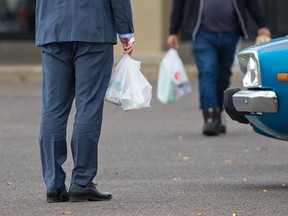Here at home, there’s no reason to believe Canadian consumers will react any differently to a ban on single-use plastics. Canadians are just as likely to reach for the convenient substitute, whether that’s heavier paper products or heavier plastic products not covered under existing bans.
Article content
Despite a court ruling late last year, which deemed the Trudeau government ban on single-use plastic (cutlery, straws, grocery bags, etc.) “unreasonable and unconstitutional,” the ban essentially remains in place pending appeal or further regulatory action. But according to the government’s own data and analysis, plastic waste is a virtual non-issue in Canada, as 99% of all plastic waste is disposed of safely in landfills or is incinerated. And less than 1% of Canada’s plastic waste finds its way into the environment.
Advertisement 2
Article content
Moreover, there’s great potential for people to replace banned plastic items, including plastic grocery bags, with other plastic bags not included in the ban such as heavy gauge “reusable” shopping totes and other types of plastic trash bags made of heavier-gauge plastics than the filmy bags banned from grocery stores.
Article content
In New Jersey, for example, while plastic grocery bag use did decline following a statewide ban in 2022, plastic substitute materials skyrocketed, plastic consumption rose threefold for heavier reusable bags and sixfold increase for woven and non-woven polypropylene bags, which are not produced domestically, not recycled nor do they contain recycled content. Freedonia, a market research firm, found that in New Jersey “increased consumption of polypropylene bags” contributed to a “500% increase in greenhouse gas (GHG) emissions compared to non-woven polypropylene bag production” and that “non-woven polypropylene … consumes over 15 times more plastic and generates more than five times the amount of GHG emissions during production per bag than polyethylene plastic bags.” In other words, the ban helped increase pollution.
Article content
Advertisement 3
Article content
In California, an environmental interest group called CALPIRG recently issued a report generally favouring plastic bag bans, observing they do, indeed, reduce the use of banned bags. However, the report notes “loopholes,” which allow consumers to use heavier plastic bag alternatives, results in more plastic consumption and waste — not less. According to CALPIRG, plastic bag disposal rates increased in one jurisdiction (Alameda) from 157,000 tons in the year before the ban on single-use grocery bags to 231,000 tons in 2021. On a per-person basis, it rose from 4.1 tons disposed of per 100,000 people to 5.9 tons disposed of per 100,000 over that same span.
In both New Jersey and California, efforts are underway to “fix” the loopholes that have allowed proliferation of plastic consumption and waste in the wake of plastic bag bans. However, these actions are unlikely to work unless they can somehow stop consumers from simply switching to plastic garbage bags or buying online heavier-gauge plastic shopping totes (and trashing them after a few shopping trips). Consumers have already shown they’re prepared to do these things.
Advertisement 4
Article content
Here at home, there’s no reason to believe Canadian consumers will react any differently to a ban on single-use plastics. Canadians are just as likely to reach for the convenient substitute, whether that’s heavier paper products or heavier plastic products not covered under existing bans.
If sanity reigned, Canada would get ahead of the perverse consequences likely to flow from plastic bans by scrapping the entire idea and allowing consumers to consume what they believe best suits their lives and pocketbooks. Canada already has an admirable waste management system that keeps 99% of disposed plastics safely locked away in environmentally protective landfills or eliminates them completely through incineration.
There’s no need for plastic bans or a governmental takeover of the plastics sector via regulation. Government should throw these bans in the bin.
Kenneth Green is a senior fellow at the Fraser Institute.
Article content



